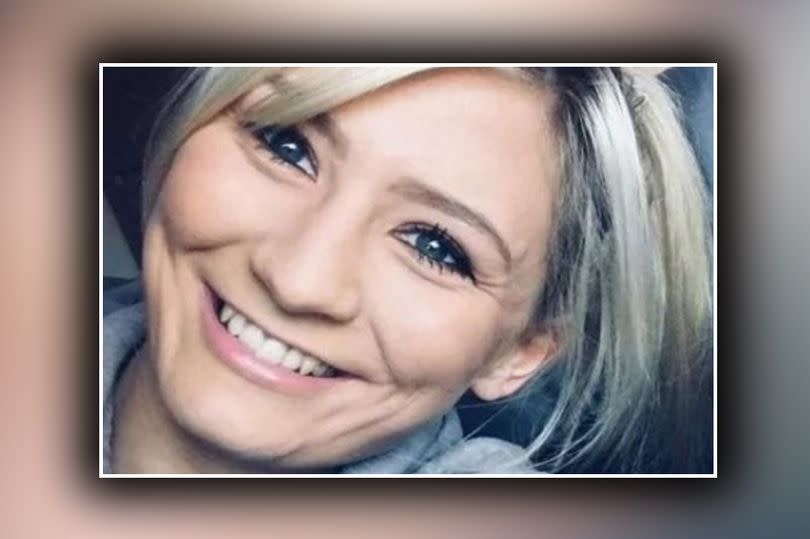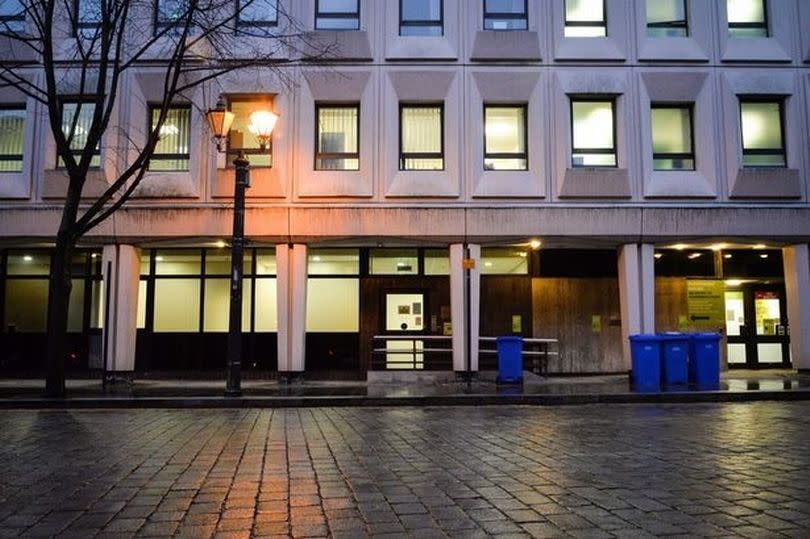Tormented mental health nurse found dead following stay at psychiatric hospital as family suffers double tragedy

A mental health nurse tormented by her sister's death was found dead at home following a stay at a psychiatric hospital, an inquest heard. Natalie Cunliffe's loved ones - devastated after her sibling took her own life - told a coroner their concerns were not 'taken seriously' by staff during her treatment.
Mum-of-two Ms Cunliffe, described as 'beautiful inside and out', was found hanged at her home in Tyldesley, Wigan, on February 6. She was 29. An inquest into her death - attended by her parents, sibling and partner - at Bolton Coroners' Court examined her care by mental health medics prior to her death.
Assistant coroner Alexander Frodsham heard Ms Cunliffe was adored by her two young daughters; was 'loving'; and was 'full of fun'. But her mother Sharon said she struggled.
READ MORE: 'I never thought something was wrong with me... within weeks I felt like I was on death row'
READ MORE: He was a family friend entrusted to get a 15-year-old girl safely home... before it ended in tragedy
She said her daughter saw friends having a 'whale of a time' on social media, while she was not. Ms Cunliffe's mental health began to deteriorate, her mum said, when her elder sister took her own life in February 2022.
Her sibling's death, the court heard, was 'incomprehensible' and 'came out of the blue'. Ms Cunliffe, the court heard, felt an 'extra burden' as she felt she could have 'saved her' because she was a mental health nurse.
Ms Cunliffe's mother said that was 'completely wrong' as nobody knew her sister was 'in the place she was in'. The inquest heard Ms Cunliffe took time off work to grieve and to deal with her mental health battle.
She booked a five-day therapy course last August. When she didn't go, 'alarm bells' began to ring among her loved ones. Her mother said that on November 14, her daughter said she was going to A&E in Wigan to 'prove there was nothing wrong with her'.
Ms Cunliffe was then admitted to Cygnet Nield House, a mental health hospital for woman in Crewe. The court heard Ms Cunliffe agreed to go as a voluntary patient, but later 'begged' her mother to take her home.

She was discharged after a week and plans were put in place for her to be given home-based treatment. Ms Cunliffe's mother said she feared her daughter was 'telling people what they wanted to hear'. She said she told staff at Cygnet Neild House she 'could be quite manic'.
Mrs Cunliffe told the court she told staff her daughter was 'showing signs of 'psychosis', but those fears were 'dismissed and put down'. "We felt we weren't being taken seriously as a family," she said.
"As a family, we tried are absolute darnedest to make people listen and we were not heard. It wasn't taken seriously and until my dying day, I won't know why."
Ms Cunliffe's partner Jonathan Jones told the court she told him she was 'fine' during her stay at Cygnet and 'wanted to leave', adding: "Obviously, I wanted her to come home. It wasn't nice her being there in the first place, but she needed to be there... she needed help."
Mr Jones said Ms Cunliffe began to believe her sister was still alive and that she was being 'tricked'. He said prior to her being admitted, he received calls and texts from Ms Cunliffe saying she wanted to end her life.
Mr Jones said he once walked in on her writing a 'will', before she ripped it up. Ms Cunliffe, as an 'informal' patient could not be sectioned under the Mental Health Act and was free to leave, he said.
She 'knew what she was doing' as a mental health nurse, Mr Jones added. Following Ms Cunliffe's discharge, a seven-day follow-up was arranged, but she wasn't contactable by phone and was not at home when staff visited, the court heard.
Ms Cunliffe's case was told and her treatment ended. Following a mental health assessment on January 4, Ms Cunliffe was seen by the Greater Manchester Mental Health NHS Foundation Trust home-based treatment team.
On January 7, she admitted putting a ligature around her neck, but said she took it off and didn't act her on suicidal thoughts. Ms Cunliffe then began having frequent home visits. Two days later, Ms Cunliffe had a mental health assessment with Dr Andras Gyula Juhasz, a consultant psychiatrist at Royal Bolton Hospital.
Dr Juhasz told the inquest it was 'clear' she was 'depressed and cagey', but that she 'engaged very well'. He prescribed Ms Cunliffe an anti-depressant and arranged for her to receive psychological support.
He told the inquest he, like the doctors at Cygnet, did not think Ms Cunliffe had psychotic symptoms. She did, however, have 'unusual preoccupations', Dr Juhasz told the court, including with her late sister's favourite colour, green. These preoccupations were not in themselves enough to diagnose Ms Cunliffe with psychosis, the doctor said.
Asked by Ms Cunliffe's family why she wasn't sectioned, Dr Juhasz said that for a patient to be detained, they have to show they are not willing to receive treatment or work with staff, which was not the case. On January 19, the court heard, Christopher France - a senior health practitioner - visited Ms Cunliffe at home and noted an improvement in her mood.
Her mother said her daughter, however, was 'pulling the wool over everyone's eyes' and 'paying lip service to what everyone wanted to hear'. Mrs Cunliffe said she was stopped, by her daughter, accompanying her to meetings with medics, so struggled to get across how she was day-to-day. She said she felt unheard.
Dr Juhasz acknowledged the 'very difficult' balance between respecting Ms Cunliffe's confidentiality, while getting a clear picture of her mental health, but insisted he did not feel she was an 'imminent suicide risk'.
Asked if it would have been possible for someone like Ms Cunliffe, with a professional mental health service background, to 'hoodwink' others by 'disguising their illness', Dr Juhasz said Mr France was 'very experienced', and that she was not considered to be 'putting on an act'.
"There was an improvement, then clearly she did not improve lastingly, which is very regrettable but not something we could have seen happening," he added. Her mother said she was not taking her medication as prescribed, describing her routine as 'hit and miss'.
On February 3, the court heard Ms Cunliffe was visited by a community mental health nurse and told them she had received her P45 from work. Her relationship had also broken down and it was close to the anniversary of her sister's death.
Three days later, another nurse visited, but there was no answer. That night, she dropped the kids at her mum's and left. Mrs Cunliffe later text her daughter, but didn't get a reply. She called, but there was no answer.
Her dad Clifford went to her house, but couldn't get in as his daughter had left her key in the lock. The police forced entry, before Ms Cunliffe was found hanged. Detectives said there was no third party involvement, nor were there suspicious circumstances.
Assistant coroner Mr Frodsham said lessons had been learned and that there were no identified 'failings'. He said he did not find it necessary to file a 'Prevention of Future Deaths' report.
Recording a narrative conclusion, he said Ms Cunliffe died having 'applied a ligature with the intention to end her life', concluding it was a case of suicide.
Following the inquest’s conclusion a spokesperson for Greater Manchester Mental Health NHS Foundation Trust (GMMH) said: "We are saddened by Natalie’s death, and we send our heartfelt sympathies to her family.
“Since Natalie’s death, we have made a number of improvements to our services, including strengthening our procedures for documenting and communicating risk. We are encouraged that the Coroner has noted this progress.”
When approached Cygnet Nield House, run by Cygnet Health Care declined to comment.
A previous version of this article reported that Ms Cunliffe's father had forced his way into her house and found her. In fact, it was the police who entered Ms Cunliffe's property and found her. The article has been amended accordingly and we would like to apologise for the error. This correction has been published following an upheld ruling by the Independent Press Standards Organisation.

 Yahoo News
Yahoo News 
